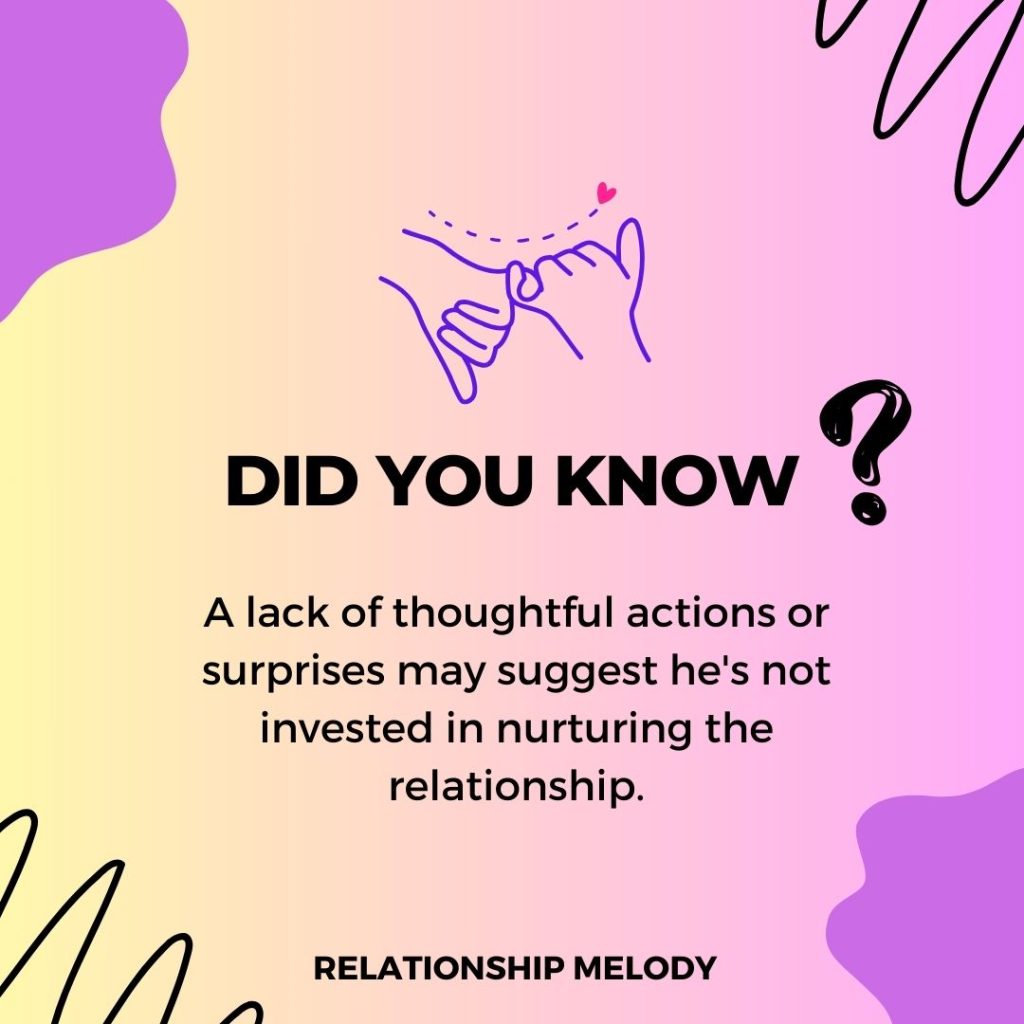25 Signs He Is Testing You
Navigating the intricacies of relationships can sometimes feel like solving a complex puzzle. As you delve deeper into the dating world, you may encounter situations where you wonder if the person you’re interested in is testing you.
These tests, often subtle and indirect, can reveal a lot about their intentions and the potential future of the relationship. In this blog post, we will discuss 25 signs that may indicate your partner is testing you, helping you decipher their actions and motivations.
25 Signs He Is Testing You
Here are 25 signs to know.
#1 Increased Absence:
If your partner starts to withdraw or create distance, it may be a sign that he is testing you. This behaviour allows him to assess your reaction and evaluate your level of attachment. It’s important to communicate openly and honestly about your feelings to understand the reasons behind your actions.
#2 Intentional Delays:
Purposefully making you wait for replies or appointments can be a way for your partner to test your patience and understanding.
This test aims to determine how you handle situations when things don’t go as planned. It’s essential to maintain open lines of communication and express your feelings if such delays become a recurring pattern.
#3 Unexpected Jealousy:
If your partner creates situations to spark jealousy, it could be a test to assess your ability to handle jealousy and how you react to it. It’s important to address these feelings calmly and have a conversation about trust and security in the relationship.
#4 Intense Conversations:
Engaging in deep conversations about sensitive topics may be a way for your partner to test your emotional intelligence and your ability to handle difficult subjects.
It’s crucial to approach these conversations with empathy, active listening, and a willingness to understand each other’s perspectives.
#5 Flirting with Others:
Your partner flirting with others in your presence can be a test to observe your level of trust and security in the relationship. It’s important to communicate your feelings and establish boundaries regarding acceptable behaviour to ensure a healthy and respectful relationship.
#6 Changing Plans Last Minute:
Your partner changing plans unexpectedly can be a test to assess your adaptability and flexibility. It’s important to communicate your needs and expectations regarding plans and discuss how such changes impact you both.
#7 Giving Silent Treatment:
Purposefully ignoring you is a way for your partner to test your level of independence and need for constant communication. It’s essential to address this behaviour and discuss healthier ways to express emotions and resolve conflicts.
#8 Taking Longer to Respond:
If your partner intentionally takes longer to respond, it may indicate a test to evaluate your level of neediness and how much attention you require. Openly communicate your needs for communication and discuss healthy ways to balance each other’s expectations.
#9 Sharing Vulnerabilities:
Opening up about personal struggles or fears can be a test to assess your empathy, compassion, and ability to provide support. It’s important to listen actively, offer understanding, and create a safe space for vulnerability in the relationship.
#10 Introducing You to Important People:
Introductions to family and close friends can be a way for your partner to observe how you handle social situations and interact with significant individuals in his life. It’s important to be genuine, and respectful, and show an interest in getting to know these people.
#11 Monitoring Your Social Media:
If your partner pays close attention to your online activities, it could indicate a desire to gauge your trustworthiness and commitment. It’s important to have open conversations about privacy, boundaries, and trust in the context of social media.

#12 Engaging in Healthy Debates:
Testing your ability to disagree respectfully and engage in constructive arguments allows your partner to assess your communication and conflict-resolution skills. It’s crucial to approach debates with respect, active listening, and a willingness to find common ground.
#13 Cancelling Plans to Test Priorities:
Postponing or cancelling important plans may be a test to see if you understand and respect your partner’s priorities. It’s essential to have open communication about each other’s commitments and find a balance that works for both of you.
#14 Provoking Your Emotional Responses:
Intentionally provoking strong emotional reactions is a way for your partner to test your emotional stability and how you handle stress. It’s important to express your feelings calmly and have discussions about emotional well-being and healthy coping mechanisms.
#15 Observing Your Supportive Actions:
Testing your willingness to support your partner during challenging times allows him to assess your loyalty and commitment. It’s crucial to be there for each other, communicate your needs, and show empathy and understanding in difficult situations.
#16 Initiating Tempting Situations:
By presenting tempting scenarios, your partner can evaluate your loyalty, trust, and ability to resist potential threats to the relationship. It’s important to maintain open communication, establish boundaries, and demonstrate your commitment to the relationship.
#17 Testing Financial Compatibility:
Assessing your views on money and financial responsibility helps your partner gauge your compatibility with long-term goals. It’s important to have open discussions about finances, financial goals, and how you both approach money matters.
#18 Evaluating Shared Responsibilities:
Creating situations where you must collaborate on tasks allows your partner to observe your teamwork and problem-solving abilities. It’s crucial to communicate effectively, share responsibilities, and support each other in achieving common goals.
#19 Paying Attention to Your Boundaries:
Testing how you establish and communicate personal boundaries helps your partner understand your need for autonomy and respect. It’s essential to express your boundaries clearly and have ongoing conversations about consent and personal space.
#20 Assessing your Listening Skills:
By observing how well you listen and remember details, your partner can evaluate your attentiveness and interest in his life. It’s important to actively listen, show genuine interest, and engage in meaningful conversations.
#21 Testing your Support for Personal Goals:
Your partner might assess how supportive you are of his ambitions and aspirations to determine if you are a compatible partner. It’s important to encourage each other’s personal growth, offer support, and communicate your own goals as well.
#22 Challenging Your Trust:
Intentionally placing you in situations that challenge your trust in him allows your partner to assess your trustworthiness. It’s crucial to address trust issues openly, rebuild trust when necessary, and establish a foundation of honesty and reliability.
#23 Evaluating Reaction to Success:
Testing how you respond to your partner’s accomplishments provides insights into your ability to celebrate his achievements without envy. It’s important to be genuinely happy for each other’s successes, communicate your pride, and foster a supportive environment.
#24 Testing Long-Distance Resilience:
Creating distance between you two can help your partner assess the strength of your bond and your commitment to maintaining the relationship. It’s crucial to communicate regularly, establish trust, and find ways to bridge the physical distance.
#25 Assessing Relationship Milestones:
By bringing up plans, your partner can gauge your enthusiasm and commitment to the long-term viability of the relationship. It’s important to have open conversations about your shared vision, goals, and the direction you want the relationship to take.
Read more: Signs He Is Taking His Time.
Conclusion:
In the complex world of relationships, deciphering a partner’s intentions can be challenging. By recognizing these 25 signs, you can gain insight into whether he is testing you or genuinely interested in building a strong connection.
Remember, open communication and trust are crucial in any relationship. If you notice several positive signs, it may be a sign of a healthy partnership worth pursuing.
However, it’s important to trust your intuition and evaluate the overall dynamic to make the best decisions for your emotional well-being.
Liked Our Article?
Our Patreon link: https://www.patreon.com/RelationshipMelody

Welcome to Relationship Melody! Our website is dedicated to all things on relationships, dating, and love! We are passionate about helping you navigate the ups and downs of love, and our goal is to provide you with valuable insights and information that will make your journey toward a fulfilling relationship smoother and more enjoyable.







